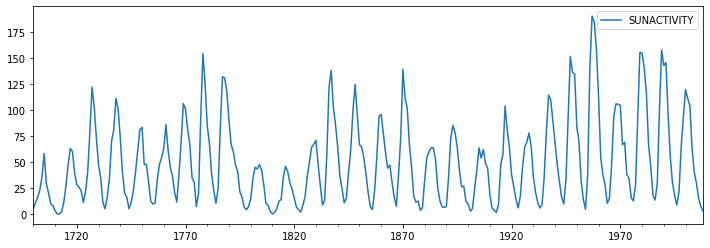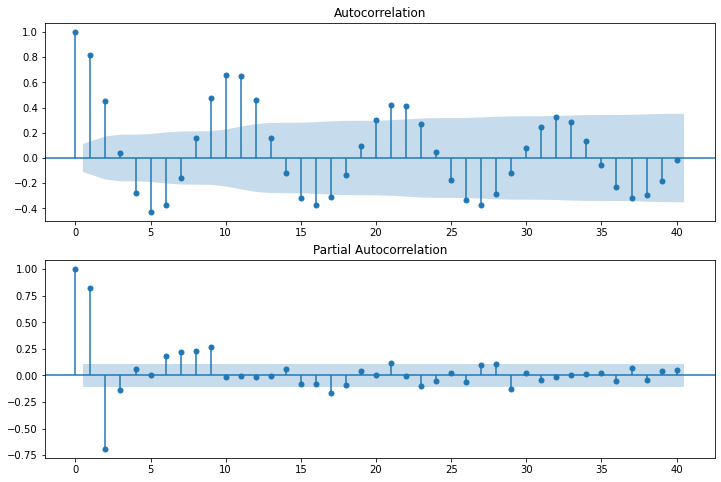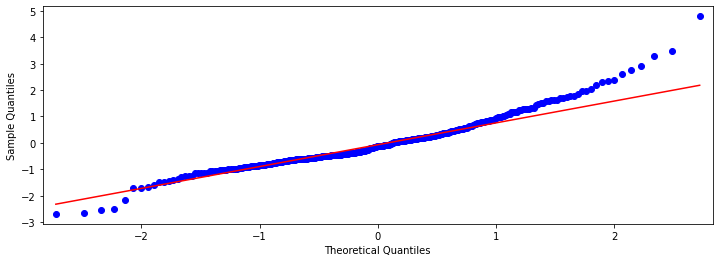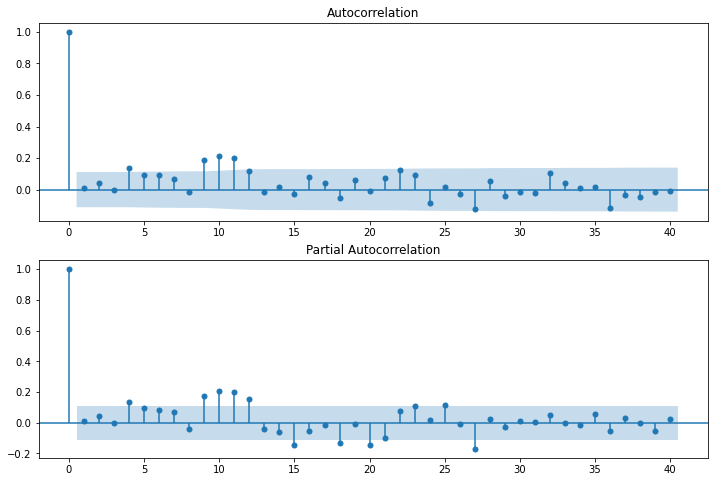Autoregressive Moving Average (ARMA): Sunspots data¶
This notebook replicates the existing ARMA notebook using the statsmodels.tsa.statespace.SARIMAX class rather than the statsmodels.tsa.ARMA class.
[1]:
%matplotlib inline
[2]:
import numpy as np
from scipy import stats
import pandas as pd
import matplotlib.pyplot as plt
import statsmodels.api as sm
[3]:
from statsmodels.graphics.api import qqplot
Sunspots Data¶
[4]:
print(sm.datasets.sunspots.NOTE)
::
Number of Observations - 309 (Annual 1700 - 2008)
Number of Variables - 1
Variable name definitions::
SUNACTIVITY - Number of sunspots for each year
The data file contains a 'YEAR' variable that is not returned by load.
[5]:
dta = sm.datasets.sunspots.load_pandas().data
[6]:
dta.index = pd.Index(pd.date_range("1700", end="2009", freq="A-DEC"))
del dta["YEAR"]
[7]:
dta.plot(figsize=(12,4));
[7]:
<AxesSubplot:>

[8]:
fig = plt.figure(figsize=(12,8))
ax1 = fig.add_subplot(211)
fig = sm.graphics.tsa.plot_acf(dta.values.squeeze(), lags=40, ax=ax1)
ax2 = fig.add_subplot(212)
fig = sm.graphics.tsa.plot_pacf(dta, lags=40, ax=ax2)

[9]:
arma_mod20 = sm.tsa.statespace.SARIMAX(dta, order=(2,0,0), trend='c').fit(disp=False)
print(arma_mod20.params)
intercept 14.793947
ar.L1 1.390659
ar.L2 -0.688568
sigma2 274.761105
dtype: float64
[10]:
arma_mod30 = sm.tsa.statespace.SARIMAX(dta, order=(3,0,0), trend='c').fit(disp=False)
[11]:
print(arma_mod20.aic, arma_mod20.bic, arma_mod20.hqic)
2622.6363381415968 2637.5697032491876 2628.606725986843
[12]:
print(arma_mod30.params)
intercept 16.762205
ar.L1 1.300810
ar.L2 -0.508122
ar.L3 -0.129612
sigma2 270.102651
dtype: float64
[13]:
print(arma_mod30.aic, arma_mod30.bic, arma_mod30.hqic)
2619.4036296633903 2638.070336047879 2626.8666144699478
Does our model obey the theory?
[14]:
sm.stats.durbin_watson(arma_mod30.resid)
[14]:
1.9564844832582977
[15]:
fig = plt.figure(figsize=(12,4))
ax = fig.add_subplot(111)
ax = plt.plot(arma_mod30.resid)

[16]:
resid = arma_mod30.resid
[17]:
stats.normaltest(resid)
[17]:
NormaltestResult(statistic=49.84700616779215, pvalue=1.4992019587606612e-11)
[18]:
fig = plt.figure(figsize=(12,4))
ax = fig.add_subplot(111)
fig = qqplot(resid, line='q', ax=ax, fit=True)

[19]:
fig = plt.figure(figsize=(12,8))
ax1 = fig.add_subplot(211)
fig = sm.graphics.tsa.plot_acf(resid, lags=40, ax=ax1)
ax2 = fig.add_subplot(212)
fig = sm.graphics.tsa.plot_pacf(resid, lags=40, ax=ax2)

[20]:
r,q,p = sm.tsa.acf(resid, fft=True, qstat=True)
data = np.c_[range(1,41), r[1:], q, p]
table = pd.DataFrame(data, columns=['lag', "AC", "Q", "Prob(>Q)"])
print(table.set_index('lag'))
AC Q Prob(>Q)
lag
1.0 0.009176 0.026273 8.712350e-01
2.0 0.041820 0.573727 7.506142e-01
3.0 -0.001342 0.574292 9.022915e-01
4.0 0.136064 6.407488 1.707135e-01
5.0 0.092433 9.108334 1.048203e-01
6.0 0.091919 11.788018 6.686842e-02
7.0 0.068735 13.291375 6.531941e-02
8.0 -0.015021 13.363411 9.994248e-02
9.0 0.187599 24.636916 3.400197e-03
10.0 0.213724 39.317881 2.233182e-05
11.0 0.201092 52.358270 2.347759e-07
12.0 0.117192 56.802110 8.581666e-08
13.0 -0.014051 56.866210 1.895534e-07
14.0 0.015394 56.943403 4.001105e-07
15.0 -0.024986 57.147464 7.747084e-07
16.0 0.080892 59.293627 6.880520e-07
17.0 0.041120 59.850085 1.112486e-06
18.0 -0.052030 60.744064 1.550379e-06
19.0 0.062500 62.038495 1.833802e-06
20.0 -0.010292 62.073718 3.385223e-06
21.0 0.074467 63.924063 3.196544e-06
22.0 0.124962 69.152771 8.984833e-07
23.0 0.093170 72.069532 5.802915e-07
24.0 -0.082149 74.345042 4.715786e-07
25.0 0.015689 74.428332 8.294018e-07
26.0 -0.025049 74.641400 1.367992e-06
27.0 -0.125875 80.040874 3.722921e-07
28.0 0.053215 81.009318 4.717356e-07
29.0 -0.038699 81.523324 6.917766e-07
30.0 -0.016896 81.621648 1.151883e-06
31.0 -0.019286 81.750227 1.869202e-06
32.0 0.105001 85.575148 8.927709e-07
33.0 0.040094 86.134872 1.247384e-06
34.0 0.008834 86.162142 2.047606e-06
35.0 0.014588 86.236784 3.263459e-06
36.0 -0.119334 91.249667 1.084187e-06
37.0 -0.036673 91.724838 1.521456e-06
38.0 -0.046204 92.481862 1.937920e-06
39.0 -0.017775 92.594310 2.989369e-06
40.0 -0.006219 92.608126 4.694971e-06
/home/travis/build/statsmodels/statsmodels/statsmodels/tsa/stattools.py:662: FutureWarning: The default number of lags is changing from 40 tomin(int(10 * np.log10(nobs)), nobs - 1) after 0.12is released. Set the number of lags to an integer to silence this warning.
FutureWarning,
This indicates a lack of fit.
In-sample dynamic prediction. How good does our model do?
[21]:
predict_sunspots = arma_mod30.predict(start='1990', end='2012', dynamic=True)
[22]:
fig, ax = plt.subplots(figsize=(12, 8))
dta.loc['1950':].plot(ax=ax)
predict_sunspots.plot(ax=ax, style='r');
[22]:
<AxesSubplot:>

[23]:
def mean_forecast_err(y, yhat):
return y.sub(yhat).mean()
[24]:
mean_forecast_err(dta.SUNACTIVITY, predict_sunspots)
[24]:
5.635549951517733